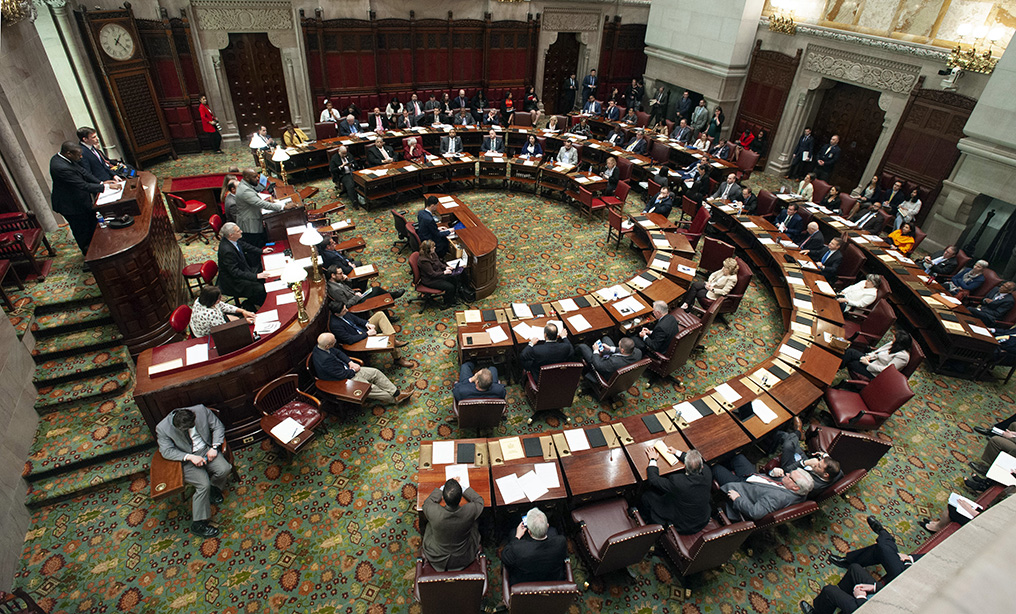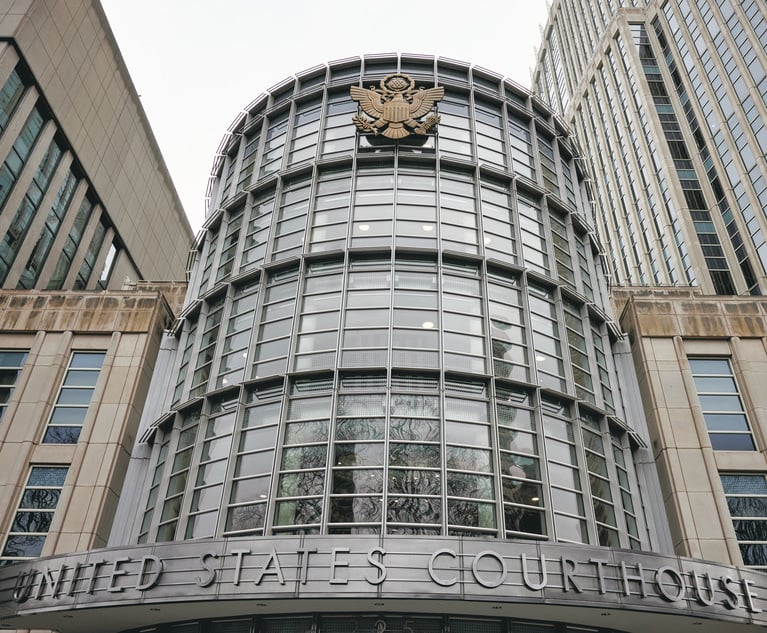NY Lawmakers Approve Bill to End Religious Exemptions for Vaccines
Opponents of the legislation have vowed to front a legal challenge when it becomes law, though Cuomo's office and the bill's sponsors remain confident that it would survive judicial review.
June 13, 2019 at 07:05 PM
5 minute read
 State senators at the Capitol in Albany. (Tim Roske/AP)
State senators at the Capitol in Albany. (Tim Roske/AP)
New York is set to eliminate the religious exemption allowing parents to prevent their children from receiving vaccinations, after the state Legislature voted to remove the exemption during a contentious day at the state Capitol on Thursday.
The bill was signed almost immediately by Gov. Andrew Cuomo, who had said earlier this week that he supported the measure. The new law takes effect immediately.
State Sen. Brad Hoylman, D-Manhattan, and Assemblyman Jeffrey Dinowitz, D-Bronx, have worked in recent months to convince their colleagues to back the measure after an outbreak of measles in areas of Rockland County and New York City emerged earlier this year.
“We are dealing with a public health emergency that requires immediate action,” Hoylman said Thursday. “The question of public safety is at issue.”
It was almost in danger of not passing Thursday when it failed to initially gain support from a majority of members in the Assembly Health Committee. Assemblyman Nader Sayegh, D-Westchester, changed his vote at the last minute, which allowed the bill to go to the floor.
But even after it came before the entire chamber, Democrats remained split on the measure. Some argued that parents should have the choice whether to vaccinate their children. Others were concerned the bill could be interpreted as unconstitutional.
“It's not about vaccines at all. It's about religious rights,” said Assemblyman Thomas Abinanti, D-Westchester. “It's about whether New York state, which for years has protected religious rights, will take the drastic step of removing from our statutes New York's implementation of our Constitution's First Amendment.”
Abinanti was one of more than a dozen Democrats in the Assembly who voted against the measure, which passed the chamber by a razor-thin margin of 77 votes in favor, two above the threshold for passage. The State Senate later approved the bill by a 36-26 vote.
The legislation would not force anyone to vaccinate their children. It would, instead, prohibit parents from claiming a religious exemption to vaccines in order for their children to attend school or day care in New York. Parents could forgo vaccinations, but their children would be barred from attending day care or school, regardless of whether it's a public or private institution.
Dinowitz, who sponsors the bill, said during the floor vote that some have misinterpreted it to mean that parents would be required to vaccinate their children, regardless of whether they attend school or not. That's not true, he said.
“No, no one would be forced to vaccinate,” Dinowitz said. “Some have said that, but that's not the case.”
Medical exemptions to vaccine requirements would remain in place, though opponents of the legislation have said those are hard to come by. The bill is intended to prevent parents from claiming a religious exemption to vaccines when their reasoning has nothing to do with religion.
Opponents of the legislation have vowed to front a legal challenge when it becomes law, though Cuomo's office and the bill's sponsors remain confident that it would survive judicial review. Alphonso David, counsel to the governor, said Wednesday that his office has reviewed the legislation and found it to be airtight against litigation.
“We've reviewed the bill carefully, we've spoken to [Sen.] Brad Hoylman and the sponsor in the Assembly,” David said. “We believe this current iteration would survive a challenge.”
Hoylman, who sponsors the bill in the Senate, has argued that the legislation's constitutionality is supported by case law, some of which is more than a century old.
The U.S. Supreme Court in Jacobson v. Massachusetts, decided in 1905, held that Massachusetts' compulsory vaccination law was a lawful exercise of its police power to protect public health and safety and therefore didn't violate the plaintiff's 14th Amendment liberty interest.
A different case, decided only a few years ago, was brought by a group of parents who challenged New York's requirement to have their children vaccinated in order to attend public school. They had applied for religious exemptions but were either denied or were subject to a different section of state law that prohibited them from being in school unvaccinated.
The U.S. Court of Appeals for the Second Circuit said, in a decision on the case in 2015, that not only was the state's law constitutional, the Legislature could go further if it wanted to.
“New York could constitutionally require that all children be vaccinated in order to attend public school,” the appellate court wrote. “New York law goes beyond what the Constitution requires by allowing an exemption for parents with genuine and sincere religious beliefs.”
Advocates rallied with their children at the Capitol hours before the measure was approved by either chamber on Thursday, and even attended the committee meeting where the bill moved. As members of the Assembly cast their vote to approve the bill, one still seemed confident they could roll back the legislation in the future.
“We'll be back,” the advocate said. “This isn't over.”
READ MORE:
Cuomo Urges NY Lawmakers to Address Rape Statute, Sexual Harassment Before Leaving Albany
Lawmakers in New York Reach Deal to Make Permanent and Expand Protections of State's Rent Laws
NOT FOR REPRINT
© 2025 ALM Global, LLC, All Rights Reserved. Request academic re-use from www.copyright.com. All other uses, submit a request to [email protected]. For more information visit Asset & Logo Licensing.
You Might Like
View All
The Met Hires GC of Elite University as Next Legal Chief

NY Appellate Panel Cites Student's Disciplinary History While Sending Negligence Claim Against School District to Trial

'No Evidence'?: Big Law Firms Defend Academic Publishers in EDNY Antitrust Case
3 minute read
'Substantive Deficiencies': Judge Grants Big Law Motion Dismissing Ivy League Price-Fixing Claims
3 minute readTrending Stories
- 1Courts Demonstrate Growing Willingness to Sanction Courtroom Misuse of AI
- 2The New Rules of AI: Part 1—Managing Risk
- 3Change Is Coming to the EEOC—But Not Overnight
- 4Med Mal Defense Win Stands as State Appeals Court Rejects Arguments Over Blocked Cross-Examination
- 5Rejecting 'Blind Adherence to Outdated Precedent,’ US Judge Goes His Own Way on Attorney Fees
Who Got The Work
J. Brugh Lower of Gibbons has entered an appearance for industrial equipment supplier Devco Corporation in a pending trademark infringement lawsuit. The suit, accusing the defendant of selling knock-off Graco products, was filed Dec. 18 in New Jersey District Court by Rivkin Radler on behalf of Graco Inc. and Graco Minnesota. The case, assigned to U.S. District Judge Zahid N. Quraishi, is 3:24-cv-11294, Graco Inc. et al v. Devco Corporation.
Who Got The Work
Rebecca Maller-Stein and Kent A. Yalowitz of Arnold & Porter Kaye Scholer have entered their appearances for Hanaco Venture Capital and its executives, Lior Prosor and David Frankel, in a pending securities lawsuit. The action, filed on Dec. 24 in New York Southern District Court by Zell, Aron & Co. on behalf of Goldeneye Advisors, accuses the defendants of negligently and fraudulently managing the plaintiff's $1 million investment. The case, assigned to U.S. District Judge Vernon S. Broderick, is 1:24-cv-09918, Goldeneye Advisors, LLC v. Hanaco Venture Capital, Ltd. et al.
Who Got The Work
Attorneys from A&O Shearman has stepped in as defense counsel for Toronto-Dominion Bank and other defendants in a pending securities class action. The suit, filed Dec. 11 in New York Southern District Court by Bleichmar Fonti & Auld, accuses the defendants of concealing the bank's 'pervasive' deficiencies in regards to its compliance with the Bank Secrecy Act and the quality of its anti-money laundering controls. The case, assigned to U.S. District Judge Arun Subramanian, is 1:24-cv-09445, Gonzalez v. The Toronto-Dominion Bank et al.
Who Got The Work
Crown Castle International, a Pennsylvania company providing shared communications infrastructure, has turned to Luke D. Wolf of Gordon Rees Scully Mansukhani to fend off a pending breach-of-contract lawsuit. The court action, filed Nov. 25 in Michigan Eastern District Court by Hooper Hathaway PC on behalf of The Town Residences LLC, accuses Crown Castle of failing to transfer approximately $30,000 in utility payments from T-Mobile in breach of a roof-top lease and assignment agreement. The case, assigned to U.S. District Judge Susan K. Declercq, is 2:24-cv-13131, The Town Residences LLC v. T-Mobile US, Inc. et al.
Who Got The Work
Wilfred P. Coronato and Daniel M. Schwartz of McCarter & English have stepped in as defense counsel to Electrolux Home Products Inc. in a pending product liability lawsuit. The court action, filed Nov. 26 in New York Eastern District Court by Poulos Lopiccolo PC and Nagel Rice LLP on behalf of David Stern, alleges that the defendant's refrigerators’ drawers and shelving repeatedly break and fall apart within months after purchase. The case, assigned to U.S. District Judge Joan M. Azrack, is 2:24-cv-08204, Stern v. Electrolux Home Products, Inc.
Featured Firms
Law Offices of Gary Martin Hays & Associates, P.C.
(470) 294-1674
Law Offices of Mark E. Salomone
(857) 444-6468
Smith & Hassler
(713) 739-1250






